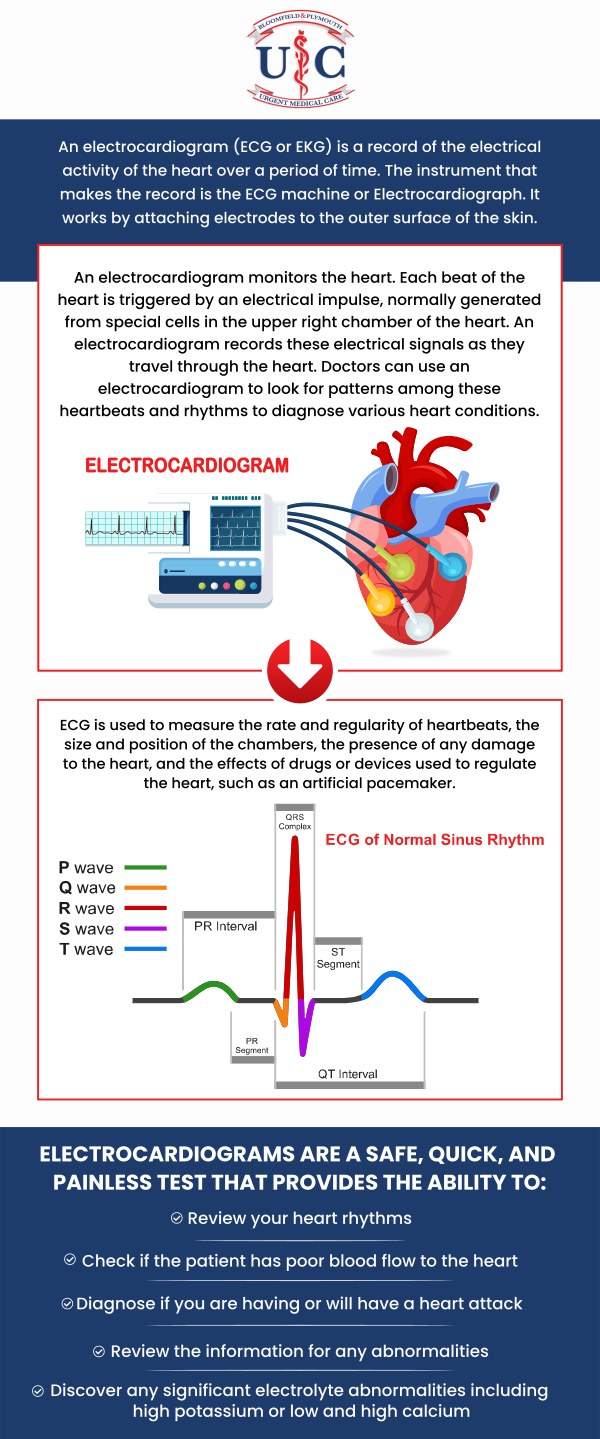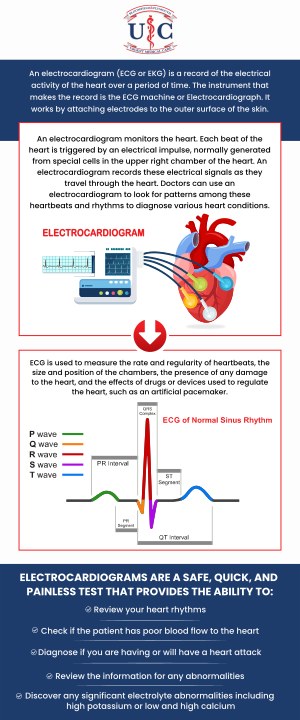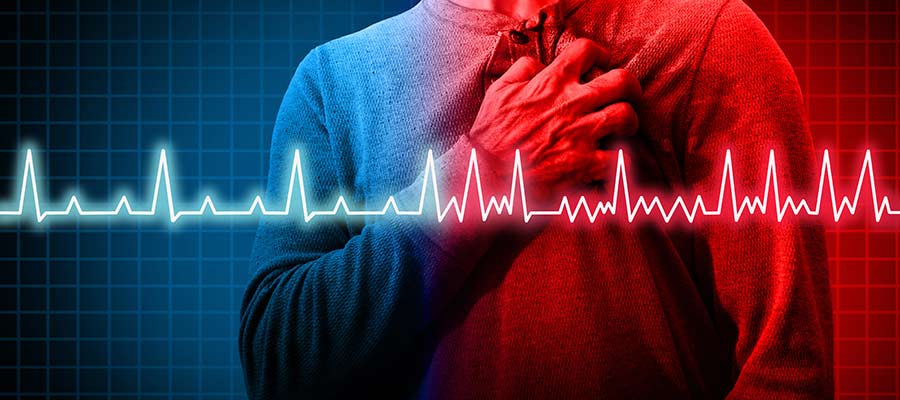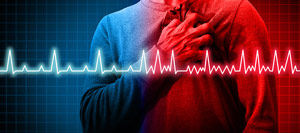Where to Get an EKG (Electrocardiogram) at Urgent Care in Plymouth, MI?
If you need an EKG (Electrocardiogram) in Plymouth, MI, Plymouth Urgent Care offers convenient and timely testing to help assess your heart’s health. An EKG is a quick and non-invasive procedure that records the electrical activity of your heart, allowing healthcare providers to detect irregularities and conditions such as arrhythmias, heart attacks, and other cardiac issues. Whether you’re experiencing symptoms or need a routine check-up, Plymouth Urgent Care ensures professional care with minimal wait times and efficient results. Contact us today for more information or book an appointment online. We are conveniently located at 41424 Ann Arbor Rd. Plymouth MI 48170.




Table of Contents:
What can an EKG test detect?
What is the difference between ECG and EKG?
Why would I need an EKG?
How accurate is an EKG test?
The heart is one of the body’s most important organs and provides oxygenated blood through the entire body, from the face to the feet and the hands to the hips. There are several characteristics of the heart and its functions, including heartbeat, heart rate, and rhythm. Electrocardiography, or EKG, is a diagnostic tool that can determine the health of several different aspects of the heart, including rate and rhythm, and has helped in millions of diagnoses since its inception in the late 1800s.
An EKG (Electrocardiogram) test can detect a variety of heart-related conditions. An EKG test can detect the following:
• Arrhythmia — Problems with the rhythm of the heartbeat are known as arrhythmia. The heart should beat steadily. However, when a person’s electrical heartbeat impulses fail to fire properly, then the heart may beat too quickly (tachycardia), too slowly (bradycardia), or at irregular intervals (arrhythmia).
• Heart Attack — A heart attack can occur when blood flow to the heart is suddenly blocked, which is normally the result of a gradual accumulation of venous or arterial blockages. Although this happens suddenly, the buildup that caused the blockage—a combination of plaque-building materials such as cholesterol and fat—has gathered over time. An EKG can detect whether a person previously had a heart attack or if they will likely have one in the future.
• Coronary Artery Disease — Also called atherosclerotic heart disease, coronary artery disease interferes with how the blood flows and can cause restrictions in circulation.
• Ischemia — Due to blockages or constrictions in the coronary blood vessels, the heart can experience ischemia, a dangerous state in which the cardiac tissue is not receiving enough oxygenated blood.
• Enlarged Heart — A healthy heart is about the size of a person’s fist, although some medical conditions can cause an abnormally enlarged heart, also known as cardiomegaly. Causes include heart failure, untreated high blood pressure, advanced age, and viral infections of the cardiac muscle. On an EKG, an enlarged heart often shows up as abnormally large waveforms, which can indicate a serious underlying condition.
At Plymouth Urgent Care, our team is dedicated to providing accurate and fast EKG testing to help detect heart conditions early and ensure you receive the care you need. If you’re experiencing symptoms or just want to monitor your heart health, trust our experienced professionals to guide you through the process with the highest level of care.
ECG (Electrocardiogram) and EKG (Electrocardiogram) are essentially the same test, both used to measure the electrical activity of the heart. The difference between the two terms lies primarily in the name. ECG stands for “electrocardiogram,” derived from the English spelling of the word “cardio,” while EKG comes from the German spelling of “cardio” (“kardiogramm”). Both terms refer to the same diagnostic procedure and are used interchangeably in medical practice.
An electrocardiogram is a simple, non-invasive test that records the electrical signals from the heart. By attaching small electrodes to the skin, an ECG or EKG detects and records the heart’s rhythm, electrical impulses, and overall function. This information helps doctors identify irregular heartbeats, damage to the heart muscle, or conditions such as arrhythmias, heart attacks, and other heart diseases.
At Plymouth Urgent Care, we offer quick and reliable EKG testing to assess your heart health. Whether you’re experiencing symptoms or need a routine check-up, our team is dedicated to providing accurate results to help diagnose and monitor your heart condition. Trust us for your heart health needs and get the care you deserve.
An EKG (Electrocardiogram) is commonly recommended when a doctor suspects a heart-related issue, such as irregular heart rhythms, chest pain, or shortness of breath. It helps evaluate the electrical activity of the heart, providing crucial information about how well your heart is functioning. If you’re experiencing symptoms like palpitations, dizziness, or fatigue, an EKG can help identify underlying problems like arrhythmias (irregular heartbeats) or heart attacks.
Additionally, an EKG is used as part of routine check-ups, especially for individuals at higher risk of heart disease due to factors like age, family history, or lifestyle choices such as smoking, high blood pressure, or diabetes. It can be used to monitor heart conditions and the effectiveness of treatments, medications, or medical devices such as pacemakers. An EKG is a simple, non-invasive test that can provide important insights into your heart health.
At Plymouth Urgent Care, we offer fast and convenient EKG testing to help diagnose heart conditions quickly and accurately. Whether you’re experiencing symptoms or need a routine evaluation, our team provides efficient and reliable care to ensure you get the attention you need for your heart health.
An EKG (Electrocardiogram) test is highly accurate in detecting abnormal heart rhythms, heart attacks, and other electrical problems in the heart. It records the heart’s electrical impulses, which can help identify various conditions such as arrhythmias, ischemia (lack of blood flow), and heart muscle damage. EKGs are particularly reliable when it comes to diagnosing irregular heartbeats or detecting signs of a previous heart attack.
However, while EKG tests are effective for detecting electrical activity and abnormalities, they may not always detect structural issues in the heart, such as heart valve problems or some forms of heart disease that aren’t related to electrical dysfunction. EKGs can also miss intermittent or mild conditions, especially if the test is performed when the patient is not experiencing symptoms. In some cases, further tests such as echocardiograms or stress tests may be needed for a comprehensive evaluation.
At Plymouth Urgent Care, we ensure the accuracy of your EKG results with professional care and advanced equipment. If you’re experiencing heart-related symptoms or require a routine check-up, our team provides quick and accurate EKG testing to help you understand your heart health and take the necessary steps toward treatment.
At Plymouth Urgent Care, you should trust us for your EKG (Electrocardiogram) testing because our experienced medical team is dedicated to providing precise and accurate heart assessments. We use advanced technology to ensure high-quality results, helping to detect any potential heart issues early. Whether you’re experiencing symptoms or just need a routine check-up, our doctors take the time to understand your health history and tailor the testing process to your needs.
Additionally, Plymouth Urgent Care prioritizes patient comfort and convenience, offering fast, professional services in a welcoming environment. Our team ensures that each patient receives personalized care and clear guidance based on their EKG results. You can trust us for reliable heart health testing with a compassionate approach to your overall well-being.
Contact us today for more information or book an appointment online. We are conveniently located at 41424 Ann Arbor Rd. Plymouth MI 48170. We serve patients from Southfield MI, Roseville MI, Rochester MI, Detroit MI, Northville MI, Westland MI, and Parshallville MI.

Check Out Our 5 Star Reviews


Additional Services You May Like
▸Urgent Care
▸Covid-19 Testing
▸Primary Care
▸Occupational Health
▸Physicals
▸Digital X-ray
▸Lab Testing
▸Telemedicine
▸Ear Wax Removal
▸Auto-Accidents
▸Vision Testing
▸Pre Op Physicals

Additional Services You May Like
▸Urgent Care
▸Covid-19 Testing
▸Primary Care
▸Occupational Health
▸Physicals
▸Digital X-ray
▸Lab Testing
▸Telemedicine
▸Ear Wax Removal
▸Auto-Accidents
▸Vision Testing
▸Pre Op Physicals



